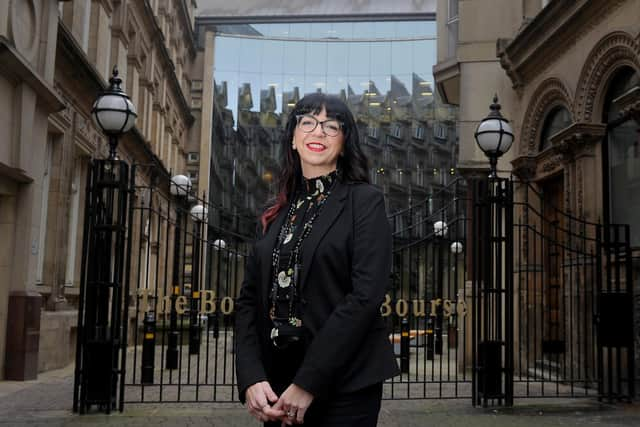'They were wrong' when I was told it was 'irrelevant' to study north, says new top think tank boss
It is a great irony, then, that she now presides over one of the most influential thinktanks across the northern regions, at a time when Westminster politics has never been more interested in what voters from either side of the Pennines and beyond have to say.
“Luckily, I was right and they were wrong”, she tells The Yorkshire Post.
Advertisement
Hide AdAdvertisement
Hide AdDr Giovannini is the new interim director of the Institute for Public Policy Research (IPPR) North, and she says “there couldn’t be a more interesting and important time to be doing this job.”


“The aim of the thinktank is really making sure that the North finds its voice, especially when it comes to having an impact on policy decisions that are made in London, and as we know, they do need to hear the voice of the North because of the regional inequalities that cut across our country,” she says.
An Italian academic, and expert in devolution and local government across England, Dr Giovannini first spent some time at the University of Exeter. However she was later attracted to Leeds Beckett University - then known as Leeds Metropolitan University - which was offering scholarships for students to focus on Northern Studies.
“Back then I ended up actually doing my PhD on the failure of regional assemblies in 2004 in the North of England,” she remembers.
Advertisement
Hide AdAdvertisement
Hide Ad“I was probably the only person studying that process, many people told me, ‘why are you doing this? The North is not relevant anymore, the assembly didn’t happen, so that agenda is over’.”
The years of research has given her an in-depth perspective on regional disparities across the country, and the countless administrations who have attempted to tackle them.
She explains: “We tend to look at England as if it was like a kind of a homogeneous sort of nation.
“But there are so many differences in terms of what happens on the ground, and in places like the North.
Advertisement
Hide AdAdvertisement
Hide Ad“The North has been on and off the political agenda for many years - the regional inequalities have been on the agenda for many years.
“But the problems are still persisting, and no government has been able to find a solution to them.
“So it’s still a very exciting area of research.”
A decade on since she first started her studies in the UK, she believes there has now been a “cultural shift” within academia which has popularised the subject, with cohorts of “young scholars from Newcastle to Liverpool” now looking at the issues that first attracted her to this “fascinating” area of study.
It has signalled “a change in the view that the North is not just an irrelevant kind of appendix of London” she adds.
“Or an area that needs the help of London to thrive.
Advertisement
Hide AdAdvertisement
Hide Ad“But actually there is more and more discussion on what the North can do for itself, and how new processes of devolution across the north can actually help foster that process.”
Dr Giovannini takes on the interim IPPR role alongside her position at De Montfort University in Leicester, where she is an Associate Professor in Local Politics and Public Policy.
In her time devoted to this area of expertise, she says she has seen “some changes” in local politics and how it is regarded by Whitehall.
Not least the introduction of a number of Metro Mayors across the country, something she believes the north has really taken advantage of.
Advertisement
Hide AdAdvertisement
Hide Ad“Creating new institutions like Metro mayors means really giving the voice to new local leaders,” Dr Giovannini says.
“And I think that the North has been very good in making the most of that opportunity, despite the fact that devolution deals give a limited amount of powers to the mayors.
“The mayors have found their space, they’ve managed to kind of harness the kind of the opportunities that there are s when leadership is locally rooted. And that’s how they’re making a difference right now.”
But will these processes make any difference?
“Is Westminster listening? Well, perhaps not in full, but now they have a number of leaders that actually put them on the spot when things don’t happen.
Advertisement
Hide AdAdvertisement
Hide Ad“So the process is still ongoing, but things have been changing. And I think that having Metro mayor’s in the North is making a difference.
With the long-promised Levelling Up White Paper expected before the end of the year, which it is hoped will lay out some more detail on how the Government’s flagship levelling up promises can be measured and achieved, Dr Giovannini hopes to see a “deepening and broadening” of devolution powers, which should mean “this process will become more ingrained and the centre will have to listen even more.”
“What will happens in areas like the North, that are usually tagged as being kind of lagging behind the in economic terms, but in fact, are thriving and are full of assets?” Dr Giovannini asks.
“What they need, perhaps is a form of institutions that have their own political voice. One that can lobby and make their voice heard at the centre.”
